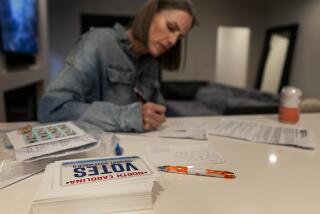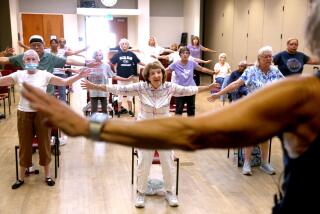Florida Has Shown Us the Voter of the Future
It couldn’t have happened in a worse state. Florida’s population, definitely skewed toward seniority, may well be the reason that the butterfly ballot, said to be an easy read for fourth-graders, has proved such a challenge for more than a few Sunshine State voters. It is even quite likely that Florida’s chad troubles may prognosticate future voting difficulties for the rest of us.
As we age, certain changes predictably happen to the great majority of us. Take, for example, the sleep cycle. Changes here include increased nocturnal awakening and less time spent in deep restorative sleep. The result, for many older people, is increased daytime drowsiness. Polling places keep daytime hours. Sleepy geriatric voters may well have problems figuring out a ballot that bright-eyed fourth-graders can take in instantaneously.
Then there’s drug metabolism. Even a cold medication can cause confusion in an elderly person because the drug is not metabolized in an aging body as quickly and as well as in a youngster. Maybe all those people who allegedly voted for Pat Buchanan by accident had the sniffles. And it’s widely known that reflexes slow and response time is delayed in older folk. If you realize that you’re punching the George W. Bush option and really want Al Gore, your reflexes may not be swift enough to stop the ongoing thrust of the instrument in your hand from traveling into the Bush spot. You may try again, re-punch for Gore, and--voila--a discarded double-punched ballot.
Since dizziness is a common problem in the elderly, caused by anything from dehydration from a diminished ability to sense thirst to the sudden palpitations of a frayed electrical system in an old heart, still other ballots may have been mismarked because the voter’s head was swimming. And cataracts, glaucoma, macular degeneration and vision problems caused by diabetes trouble the elderly eye. Eye disease can happen so slowly that even the victim is unaware of his visual limitations. I recall an elderly gentleman whose falls were attributed to a congenital foot deformity that he refused to have fixed. He did permit a cataract operation, however, and after the surgery, he had no more tumbles. Dementia of some degree is found in almost half of humans over 85.
Significantly, the risk of voter error is potentially a serious problem for some seniors. And this problem will only grow as the number of people over 65 more than doubles in the next 30 years. Yet the two major contenders for Florida’s addled vote, as well as just about every other minor presidential candidate, have managed to evade serious discussion and realistic planning for the future needs of aging baby boomers.
The tsunami will be upon us in 10 years, as the first wave of boomers turns 65. We have little time left to create the products and processes that will enable the elderly to function successfully as they come close to outnumbering the younger members of society who must provide for their increasing needs. Issues such as raising further the age at which healthy seniors can retire; creating part-time employment options to allow the able to maintain self-esteem, stamina and social contacts in the workplace; encouraging healthy habits to stave off the functional disabilities of aging; and identifying disabilities, such as dementia, that disallow activities like driving all go unaddressed by the would-be leaders of our country.
We need to consider ways to avoid elder confusion at the voting booth of the future. Ballots will need to be designed specifically for seniors with contrasting primary colors, bigger holes for arthritic hands and a weighted punching instrument that would be easier to control for shaky hands. Designated voting officials could be available to discreetly aid older or infirm citizens, and special voting booths could be designed to comfortably seat those who have difficulty standing.
Such measures would prevent the disenfranchisement of our more mature citizens and would serve as a template for the creation of senior-friendly resources in a society that may shortly become overwhelmed by the needs of its elders.


